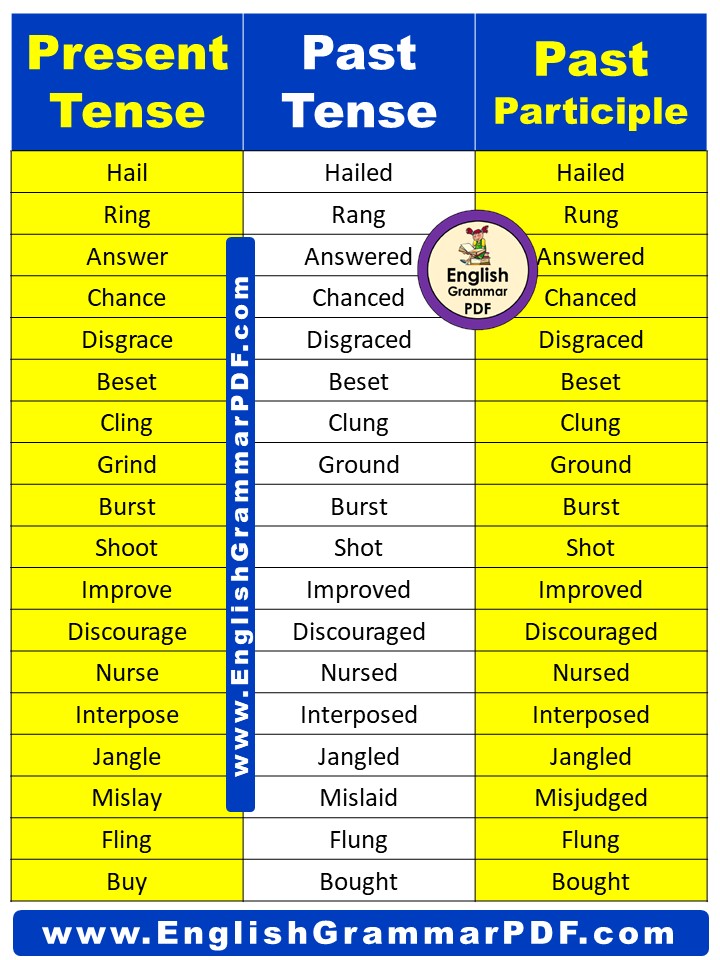Verbs are words which tell us the time of action in a sentence happened. The time that a verb shows is called tense.
| Present | Past | Past Participle |
| arise | arose | arisen |
| awake | awoke (or awaked) | awaked (or awoken) |
| bear (to give birth) | bore | born |
| beat | beat | beaten (or beat) |
| become | became | become |
| begin | began | begun |
| bet | bet | bet |
| bind | bound | bound |
| bite | bit | bitten |
| bleed | bled | bled |
| blow | blew | blown |
| break | broke | broken |
| breed | bred | bred |
| bring | brought | brought |
| burst | burst | burst |
| buy | bought | bought |
| cast | cast | cast |
| catch | caught | caught |
| choose | chose | chosen |
| come | came | come |
| cut | cut | cut |
| deal | dealt | dealt |
| dig | dug | dug |
| dive | dived (or dove) | dived |
| do | did | done |
| draw | drew | drawn |
| dream | dreamed (or dreamt) | dreamed (or dreamt) |
| drink | drank | drunk |
| drive | drove | driven |
| eat | ate | eaten |
| fall | fell | fallen |
| feed | fed | fed |
| feel | felt | felt |
| fight | fought | fought |
| find | found | found |
| flee | fled | fled |
| fly | flew | flown |
| forget | forgot | forgotten |
| forgive | forgave | forgiven |
| freeze | froze | frozen |
| get | got | got (or gotten) |
| give | gave | given |
| go | went | gone |
| grind | ground | ground |
| grow | grew | grown |
| hang (to execute) | hanged | hanged |
| have | had | had |
| hear | heard | heard |
| hide | hid | hidden |
| hit | hit | hit |
| hold | held | held |
| hurt | hurt | hurt |
| keep | kept | kept |
| know | knew | known |
| lay | laid | laid |
| lead | led | led |
| leave | left | left |
| lend | lent | lent |
| let | let | let |
| lie | lay | lain |
| light | lighted (or lit) | lighted (or lit) |
| lose | lost | lost |
| make | made | made |
| mean | meant | meant |
| meet | met | met |
| mistake | mistook | mistaken |
| pay | paid | paid |
| prove | proved | proved (or proven) |
| put | put | put |
| quit | quit | quit |
| read | read | read |
| ride | rode | ridden |
| ring | rang | rung |
| rise | rose | risen |
| run | ran | run |
| say | said | said |
| see | saw | seen |
| sell | sold | sold |
| send | sent | sent |
| set | set | set |
| shake | shook | shaken |
| shed | shed | shed |
| shoot | shot | shot |
| shut | shut | shut |
| sing | sang | sung |
| sink | sank | sunk |
| sit | sat | sat |
| slay | slew | slain |
| sleep | slept | slept |
| slide | slid | slide |
| sling | slung | slung |
| slink | slunk | slunk |
| speak | spoke | spoken |
| spend | spent | spent |
| spin | spun | spun |
| spit | spit (or spat) | spit (or spat) |
| split | split | split |
| spread | spread | spread |
| spring | sprang (or sprung) | sprung |
| stand | stood | stood |
| steal | stole | stolen |
| stick | stuck | stuck |
| stink | stank (or stunk) | stunk |
| stride | strode | stridden |
| strike | struck | struck |
| string | strung | strung |
| strive | strove (or strived) | striven (or strived) |
| swear | swore | sworn |
| sweep | swept | swept |
| swell | swelled | swelled (or swollen) |
| swim | swam | swum |
| swing | swung | swung |
| take | took | taken |
| teach | taught | taught |
| tear | tore | torn |
| tell | told | told |
| think | thought | thought |
| thrive | throve (or thrived) | throve (or thriven) |
| throw | threw | thrown |
| thrust | thrust | thrust |
| wake | woke (or waked) | waked (or woken) |
| win | won | won |
| wind | wound | wound |
| wring | wring | wrung |
| write | wrote | written |
Verb forms of Verb To be
| Present tense | Past tense | Future tense |
| is/ am/ are | was/ were | will/shall |
Now let’s use the words from the above list and understand how different forms of verbs are formed using the root word.
- We usually make the past tense by adding “d” or “ed” to the verb root word. Some verbs have irregular past tenses. We do not add “d” or “ed” to the irregular past tense verb, but change the spelling. grow becomes grew not growed.
- We make the present tense by using the verb root word or the verb “to be”, am and an “ing” word eg: walk -> walking.
- We make the future tense by using the verb “to be” and the verb root word. Will / Shall is the verb “to be”.
| Root word | Past tense | Present tense | Future tense |
| Walk | I walked. | I walk. | I will walk. |
| Help | I helped. | I help. | I will help. |
| Learn | I learned. | I learn. | I will learn. |
| Write | I wrote | I write | I shall write |
| grow | It grew | It grows | It will grow |
Keep exploring EnglishBix for quality resources on three forms of verbs and learn how they are used.
Present tense past tense past participle words list in English with PDF
If you are looking for a huge collection of Forms of verb (Present tense, past tense & Past participle) then this lesson is going to be amazing for you. You can Download PDF Book of this lesson at the end.
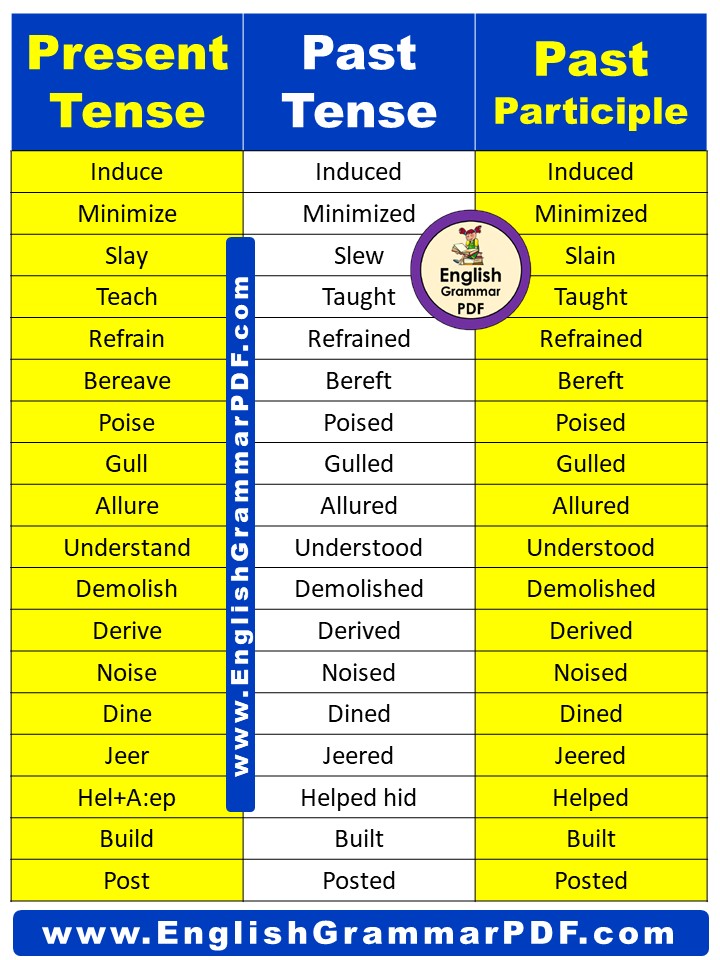

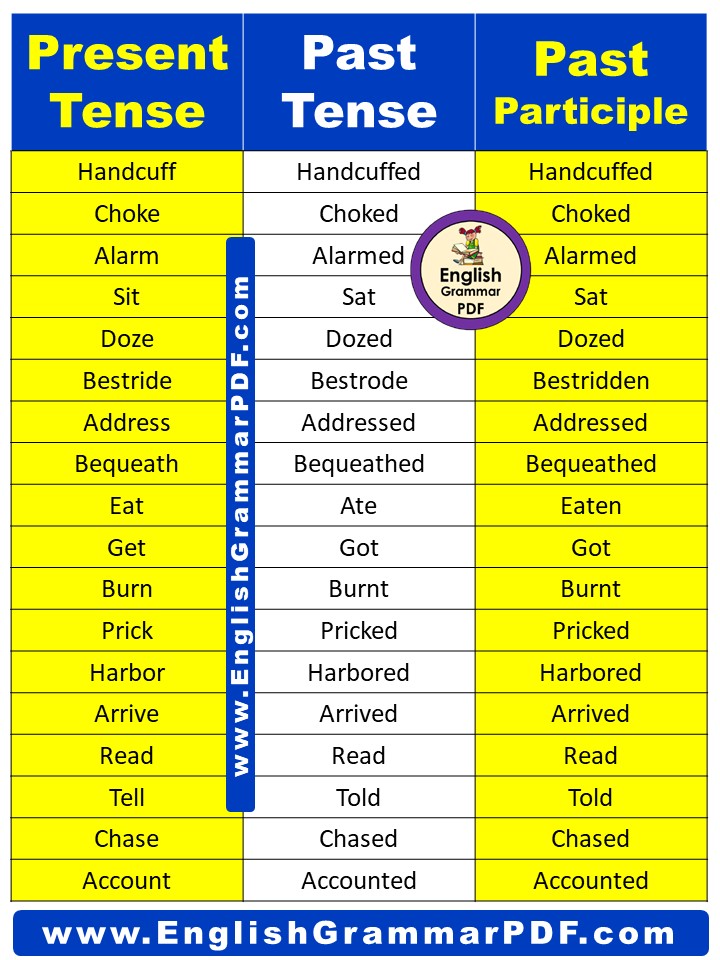
| Importune | Impounded | Importuned |
| Meet | Met | Met |
| Jump | Jumped | Jumped |
| Beat | Beat | Beaten |
| Cut | Cut | Cut |
| Awake | Awoke | Awoke |
| Pray | Prayed | Prayed |
| Embark | Embarked | Embarked |
| Cause | Caused | Caused |
| Bring | Brought | Brought |
| Throw | Threw | Thrown |
| Sow | Sowed | Sowed |
| Disagree | Disagreed | Disagreed |
| Come | Came | Come |
| Follow | Followed | Followed |
| Strive | Strove | Striven |
| Pile | Piled | Piled |
| Persuade | Persuaded | Persuaded |
| Shine | Shined | Shined/shone |
| Grumble | Grumbled | Grumbled |
| Carve | Carved | Carved |
| Altercate | Altercated | Altercated |
| Misjudge | Misjudged | Misguided |
| Mean | Meant | Meant |
| Draw | Drew | Drawn |
| Be | Was/were | Been |
| Announce | Announced | Announced |
| Shave | Shaved | Shaved |
| Forecast | Forecast | Forecast |
| Spoil | Spoilt | Spoilt |
| Comfort | Comforted | Comforted |
| Hit | Hit | Hit |
| Abuse | Abused | Abused |
| Held | Held | Held |
| Wind | Wound | Wound |
| Induce | Induced | Induced |
| Minimize | Minimized | Minimized |
| Slay | Slew | Slain |
| Teach | Taught | Taught |
| Refrain | Refrained | Refrained |
| Bereave | Bereft | Bereft |
| Poise | Poised | Poised |
| Gull | Gulled | Gulled |
| Allure | Allured | Allured |
| Understand | Understood | Understood |
| Demolish | Demolished | Demolished |
| Derive | Derived | Derived |
| Noise | Noised | Noised |
| Dine | Dined | Dined |
| Jeer | Jeered | Jeered |
| Hel+A:ep | Helped hid | Helped |
| Build | Built | Built |
| Post | Posted | Posted |
| Handcuff | Handcuffed | Handcuffed |
| Choke | Choked | Choked |
| Alarm | Alarmed | Alarmed |
| Sit | Sat | Sat |
| Doze | Dozed | Dozed |
| Bestride | Bestrode | Bestridden |
| Address | Addressed | Addressed |
| Bequeath | Bequeathed | Bequeathed |
| Eat | Ate | Eaten |
| Get | Got | Got |
| Burn | Burnt | Burnt |
| Prick | Pricked | Pricked |
| Harbor | Harbored | Harbored |
| Arrive | Arrived | Arrived |
| Read | Read | Read |
| Tell | Told | Told |
| Chase | Chased | Chased |
| Account | Accounted | Accounted |
| Hail | Hailed | Hailed |
| Ring | Rang | Rung |
| Answer | Answered | Answered |
| Chance | Chanced | Chanced |
| Disgrace | Disgraced | Disgraced |
| Beset | Beset | Beset |
| Cling | Clung | Clung |
| Grind | Ground | Ground |
| Burst | Burst | Burst |
| Shoot | Shot | Shot |
| Improve | Improved | Improved |
| Discourage | Discouraged | Discouraged |
| Nurse | Nursed | Nursed |
| Interpose | Interposed | Interposed |
| Jangle | Jangled | Jangled |
| Mislay | Mislaid | Misjudged |
| Fling | Flung | Flung |
| Buy | Bought | Bought |
| Bestride | Bestrode | Bestrided |
| Kneel | Knelt | Knelt |
| Sink | Sank | Sunk |
| Ponder | Pondered | Pondered |
| Thrust | Thrust | Thrust |
| Dig | Dug | Dug |
| Gamble | Gambled | Gambled |
| Tread | Trod | Trodden |
| Spread | Spread | Spread |
| Profane | Profaned | Profaned |
| Behead | Beheaded | Beheaded |
You can Download PDF Book of this Lesson.
DOWNLOAD PDF
About The Author
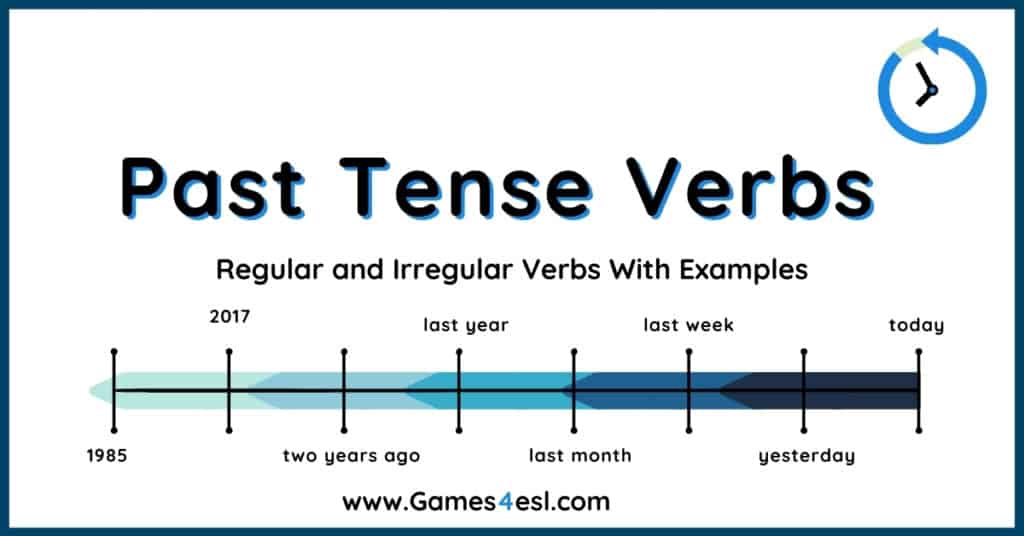
Learning many different past tense verbs is essential for English language learners if they are to talk about the past in English. Learning the past tense can, however, be quite challenging for students because there are regular and irregular past tense verbs and different rules for changing a verb into the past tense.
On this vocabulary page, you can find a list of regular and irregular past tense verbs with example sentences. We will also explain the simple past tense rules and how to make regular verbs into the past tense. And, check out the bottom of the page for related resources for learning and teaching about the past tense.
With regular verbs, there are certain rules to follow to change the verb into the past tense. Below we will explain these rules and provide examples of regular past tense verbs with example sentences.
Past Tense Rule 1 | Add -ed
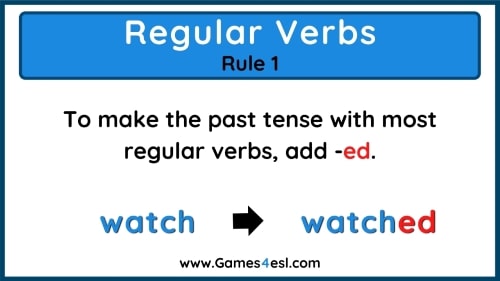
With most regular verbs, to make the past tense we simply add -ed to the end of the verb. Here are some examples of common past tense verbs that end in –ed.
- watch – watched – I watched a movie yesterday.
- play – played – Chris played soccer with his friends before school.
- talk – talked – We talked on the phone for hours last night.
- start – started – Kelly started to dance when she heard the music.
- cook – cooked – Mum cooked a delicious meal for lunch.
- walk – walked – I walked to work today.
- show – showed – I showed my ticket to get on the train.
- rain – rained – It rained all morning.
- learn – learned – I learned a lot at school today.
- clean – cleaned – I cleaned my room before going to sleep.
- wash – washed – Dad washed the dishes after dinner.
- wait – waited – I waited at the bus stop for 30 minutes.
- want – wanted – I wanted to see a movie but the tickets were sold out.
- need – needed – Matt needed to drink some water after his workout.
- end – ended – The movie ended before I even arrived.
Past Tense Rule 2 | Add -d
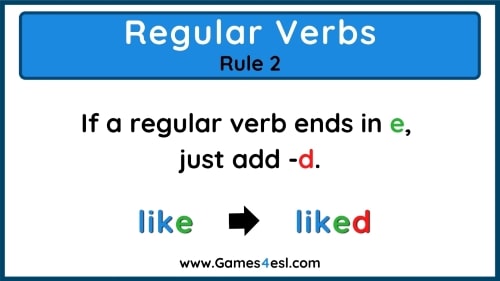
If a regular verb ends in the letter ‘e’, then to make the past tense, simply add –d. Here are some examples of common past tense verbs that end in –d.
- like – liked – I liked your performance today. It was really good.
- close – closed – I closed my eyes and immediately fell asleep.
- smile – smiled – Kelly smiled at me and I smiled back.
- type – typed – Chris typed his essay on his computer.
- race – raced – I raced here as fast as I could.
- care – cared – Sally cared for her sick puppy yesterday.
- bake – baked – Mom baked cookies. They smell delicious.
- escape – escaped – 5 people escaped from prison today.
Past Tense Rule 3 | Add -ied
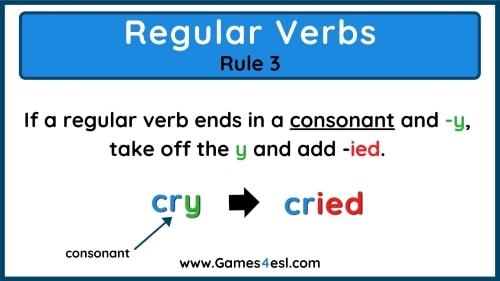
If a verb ends in a consonant followed by the letter ‘y’, then to change into a past tense verb, take off the ‘y‘ and add –ied. For example, the word ‘cry’ ends in a consonant (r) followed by ‘y’. So, cry becomes cried.
Here are some examples of common past tense verbs that end in y.
- cry – cried – I cried after reading the book. It was such a sad story.
- fry – fried – For breakfast, I fried some eggs.
- try – tried – Chris tried to win the race.
- carry – carried – Kelly’s boyfriend carried the shopping bags for her.
- study – studied – I studied all night for the test.
- marry – married – My parents got married in 1975.
- worry – worried – I worried all day about the results of the test.
Past Tense Rule 4 | Double The Consonant And Add -ed
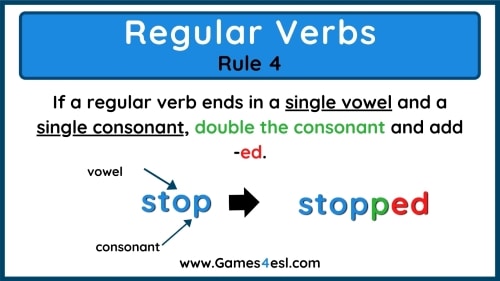
If a regular verb ends in a single vowel followed by a single consonant, then double the consonant and add –ed. This is the rule, except for words ending in the letter ‘x’.
Here are some examples of common past tense verbs which follow this rule.
- stop – stopped – The baby stopped crying when his mom picked him up.
- plan – planned – The teacher planned a fun lesson.
- hop – hopped – The rabbit hopped away when it saw me.
- clap – clapped – The audience clapped loudly at the end of the concert.
- jog – jogged – I jogged for 5 miles yesterday.
- beg – begged – The boy begged his teacher not to call his mom.
- fan – fanned – I fanned my face with a newspaper as it was so hot.
- rip – ripped – Chris ripped his jeans when bent over to pick something up.
- zip – zipped – I zipped up my jacket as it was cold.
Irregular Past Tense Verbs List
Unlike regular past tense verbs, irregular past tense verbs don’t follow any easy to remember rules. And so, students simply need to memorize irregular past tense verbs.
Here is a list of common irregular past tense verbs with example sentences.
- go – went – I went to the zoo yesterday.
- see – saw – I saw an elephant at the zoo.
- come – came – Mom came home at 11 o’clock.
- read – read – I read an interesting book last night.
- write – wrote – Kelly wrote a letter to Chris.
- meet – met – I met my friends for lunch today.
- eat – ate – We ate spaghetti and pizza.
- buy – bought – I bought a new jacket last weekend.
- is – was – Yesterday, the weather was terrible.
- make – made – Chris made a robot at school today.
- sleep – slept – I slept until midday.
- wear – wore – I wore my new jacket to school today.
- win – won – England won the 1966 World Cup.
- bring – brought – I brought sandwiches for lunch.
- catch – caught – Yesterday, my father and I caught a lot of fish.
- choose – chose – I chose this dress. What do you think?
- cut – cut – I cut my finger when I was cooking yesterday.
- dig – dug – The dog dug a big hole in the garden.
- draw – drew – Kelly drew a picture of the dog.
- drink – drank – The teacher drank 2 cups of coffee this morning.
- drive – drove – We drove all night to get here.
- fall – fell – I fell down yesterday, but I am okay.
- fight – fought – My great grandfather fought in World War 2.
- fly – flew – I flew here from Canada.
- find – found – I found this wallet. Is it yours?
- get – got – Chris got a new watch for his birthday.
- give – gave – Kelly gave Chris a new watch for his birthday.
- hear – heard – I heard that it’s your birthday today. Happy birthday.
- hide – hid – We hid behind the sofa to surprise Chris on his birthday.
- know – knew – Chris knew about the surprise party.
- lose – lost – I lost my wallet. Have you seen it?
- pay – paid – I paid a lot of money for this dress.
- ride – rode – We rode our bikes in the park at the weekend.
- run – ran – The dog just ran across the road.
- say – said – The doctor said you should get some rest.
- sing – sang – The choir sang beautifully.
- sit – sat – The students all sat down in their seats.
- speak – spoke – I spoke to my grandma last week.
- take – took – I took a shower at 8 am.
- think – thought – Chris thought the test was on Monday.
- wake – woke – I woke up at 7:30.
- break – broke – Yesterday, I fell over and broke my glasses.
Resources To Teach The Past Tense
Here are some free resources you can use to teach past tense verbs in English.
- Past Tense Regular Verbs PowerPoint
- Past Tense Irregular Verbs PowerPoint
- Past Tense Worksheets
- Past Tense Lesson Plan
- Past Tense Game
- Online Past Tense Quiz
Below is a massive list of past tense words — that is, words related to past tense. The top 4 are: past, tense, preterite and present perfect. You can get the definition(s) of a word in the list below by tapping the question-mark icon next to it. The words at the top of the list are the ones most associated with past tense, and as you go down the relatedness becomes more slight. By default, the words are sorted by relevance/relatedness, but you can also get the most common past tense terms by using the menu below, and there’s also the option to sort the words alphabetically so you can get past tense words starting with a particular letter. You can also filter the word list so it only shows words that are also related to another word of your choosing. So for example, you could enter «past» and click «filter», and it’d give you words that are related to past tense and past.
You can highlight the terms by the frequency with which they occur in the written English language using the menu below. The frequency data is extracted from the English Wikipedia corpus, and updated regularly. If you just care about the words’ direct semantic similarity to past tense, then there’s probably no need for this.
There are already a bunch of websites on the net that help you find synonyms for various words, but only a handful that help you find related, or even loosely associated words. So although you might see some synonyms of past tense in the list below, many of the words below will have other relationships with past tense — you could see a word with the exact opposite meaning in the word list, for example. So it’s the sort of list that would be useful for helping you build a past tense vocabulary list, or just a general past tense word list for whatever purpose, but it’s not necessarily going to be useful if you’re looking for words that mean the same thing as past tense (though it still might be handy for that).
If you’re looking for names related to past tense (e.g. business names, or pet names), this page might help you come up with ideas. The results below obviously aren’t all going to be applicable for the actual name of your pet/blog/startup/etc., but hopefully they get your mind working and help you see the links between various concepts. If your pet/blog/etc. has something to do with past tense, then it’s obviously a good idea to use concepts or words to do with past tense.
If you don’t find what you’re looking for in the list below, or if there’s some sort of bug and it’s not displaying past tense related words, please send me feedback using this page. Thanks for using the site — I hope it is useful to you! 🐢
That’s about all the past tense related words we’ve got! I hope this list of past tense terms was useful to you in some way or another. The words down here at the bottom of the list will be in some way associated with past tense, but perhaps tenuously (if you’ve currenly got it sorted by relevance, that is). If you have any feedback for the site, please share it here, but please note this is only a hobby project, so I may not be able to make regular updates to the site. Have a nice day! 🐐
PAST SIMPLE
V2/V+ed; did (not) + V
PAST CONTINUOUS
was/were (not) + Ving
PAST PERFECT
had (not) + V3/V+ed
PAST PERFECT
CONTINUOUS
had (not) been + Ving
последовательные
действия в прошлом
Helen put on a red dress,
did her hair and left.
событие в прошлом,
которое произошло в
указанное время
I drank tea an hour ago.
действие совершилось
в прошлом, связи с
настоящим нет
William Shakespeare wrote
a lot of plays.
прошлые привычки
He used to go to school on
foot.
Слова—сигналы
yesterday, last Friday/
week/month/ year etc, ago,
then, when, in 1985 etc.
действие длилось в
указанный момент в
прошлом
Mary was painting at 5 pm
yesterday.
действие совершалось
в прошлом и было
прервано другим
действием
Peter was watching TV
when the phone rang.
два и более действия в
прошлом совершались
одновременно
I was mopping the floor
while my sister was
washing the dishes.
Слова—сигналы
when, while, as etc.
действие в прошлом
закончилось до другого
действия или до
указанного момента
времени в прошлом
Jane had left by the time I got
there (by 7 pm).
действие полностью
завершилось, есть
видимый результат в
прошлом
She was sad because she
had failed her exam.
эквивалент Present
Perfect в прошлом
(Peter can’t find his watch. He
has lost it)
Peter couldn’t find his watch.
He had lost it.
Cлова—сигналы:
just, never, ever, already, yet,
for, since, before, by, by the
time etc.
действие совершалось в
течении некоторого
периода и закончилось в
определённое время в
прошлом
She had been working as a
model for 5 years before she got
married.
действие длилось какое—то
время в прошлом и есть
видимые результаты в
прошлом
They were wet because they
had been walking in the rain.
эквивалент Present Perfect
Continuous в прошлом
(She’s going to the doctor. Her
leg has been aching for 2 days)
She went to the doctor. Her leg
had been aching for 2 days.
Слова—сигналы:
how long, for, since
| 1. | Base Form (Infinitive): | List |
| 2. | Simple Past: | Listed |
| 3. | Past Participle: | Listed |
| 4. | Present Participle: | Listing |
| 5. | 3rd Person Singular: | Lists |

| Listed |
| Listed is the past tense of the word list. |
List past participle
| Listed |
| Listed is the past participle of the word list. |
List verb forms V1 V2 V3 V4
| Infinitive | Past Simple | Past Participle | Present Participle |
|---|---|---|---|
| List | Listed | Listed | Listing |
Conjugation of List
| Simple / Indefinite Present Tense |
| I list. |
| He/She/It lists. |
| You/We/They list. |
| Simple Past Tense |
| I listed. |
| He/She/It listed. |
| You/We/They listed. |
| Simple Future Tense |
| I will/shall list. |
| He/She/It will list. |
| You/We/They will/shall list. |
| Present Continuous Tense |
| I am listing. |
| He/She/It is listing. |
| You/We/They are listing. |
| Past Continuous Tense |
| I was listing. |
| He/She/It was listing. |
| You/We/They were listing. |
| Future Continuous Tense |
| I will be listing. |
| He/She/It will be listing. |
| You/We/They will be listing. |
| Present Perfect Tense |
| I have listed. |
| He/She/It has listed. |
| You/We/They have listed. |
| Past Perfect Tense |
| I had listed. |
| He/She/It had listed. |
| You/We/They had listed. |
| Future Perfect Tense |
| I will have listed. |
| He/She/It will have listed. |
| You/We/They will have listed. |
| Present Perfect Continuous Tense |
| I have been listing. |
| He/She/It has been listing. |
| You/We/They have been listing. |
| Past Perfect Continuous Tense |
| I had been listing. |
| He/She/It had been listing. |
| You/We/They had been listing. |
| Future Perfect Continuous Tense |
| I will have been listing. |
| He/She/It will have been listing. |
| You/We/They will have been listing. |
More verb past tense
- Look
- Loose
- Lose
- Love
- Magnify
|
PAST |
|||
|
Past Simple |
Past Continuous |
Past Perfect |
Past Perfect Continuous |
|
V-ed, V2 |
was|were + V-ing |
had + V3 |
had been +V ing |
|
· · · · |
· · · (обычно выполняемых разными · |
· · |
· how long · |
|
yesterday, yesterday morning/evening etc., last |
while, when, as, all day/night/morning/at 5 o’clock |
before, after, already, just, till/until, when, by, |
before, since, for, how long, till/until |

